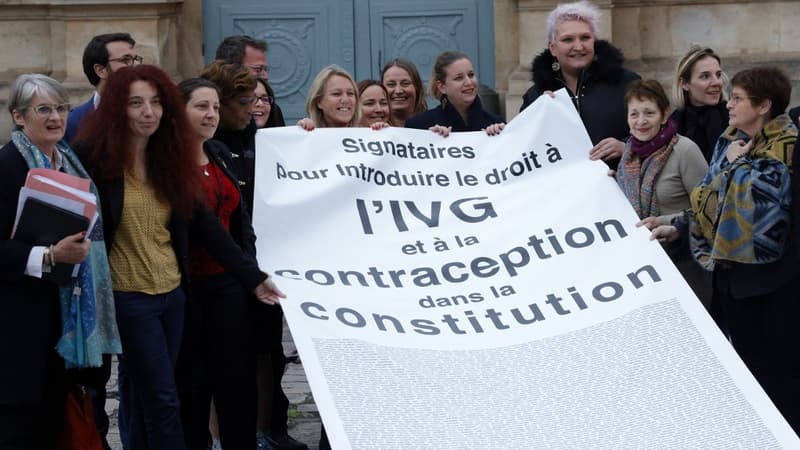“It is an incomplete victory”: feminist associations welcomed this Thursday the Senate vote in favor of the inclusion in the Constitution of “women’s freedom” to resort to abortion, but some are concerned about this formulation that abandons the notion of “right “.
At the end of an impassioned debate, the senators approved on Wednesday night a proposed LFI constitutional law, which had been approved in November, in first reading, by the National Assembly.
However, the text has been completely rewritten, through an amendment by Senator LR Philippe Bas. He proposes complementing article 34 of the Constitution with the following formula: “The law determines the conditions under which a woman’s freedom is exercised to end her pregnancy.” A wording that no longer refers to the “right” to abortion initially present.
“Not the correct letter”
“It is a strong signal because the Senate does not usually vote in favor of women’s rights” but “it is not the correct wording, for us it is important to include abortion in the Constitution as law”, comments Sarah Durocher, co-chair of Family planning.
For Fabienne El Khoury, spokeswoman for the “Osez le féminisme!” association, this absence of the term “right” is synonymous with “incomplete victory.”
“The notion of law obliges the State to guarantee access to this right”, while “freedom is exercised by itself”, he stresses.
The wording proposed by the Senate “seems potentially dangerous to us”, since it could allow the appearance of a new law that defines more restrictive conditions of access to abortion, warns Suzy Rojtman, member of the collective “Abortion in Europe – Women decide”.
However, he considers the favorable vote of the senators as a “positive sign” that “allows the parliamentary shuttle to continue.” A pure and simple rejection of the text by the Senate would have buried it: a constitutional bill must be voted on in the same terms by both chambers and then submitted to a referendum.
On Twitter, the philosopher and writer Camille Froidevaux-Metterie also explained that the disappearance of the word “law” was “not trivial”:
“Abortion is not a simple freedom, but a fundamental right on which the inclusion of women in the democratic project depends. Without reproductive rights, women are no longer fully free and equal subjects”.
“Threats” against abortion
Philippe Bas, a pillar of the senatorial right, justifies the new wording by the desire to “guarantee the balance of the Veil law.” “There is no absolute right: there is freedom, subject to the reconciliation between the rights of the pregnant woman and, after a certain time, the protection of the unborn child,” he said.
This “balance” of the “woman’s right to abortion with other constitutionally protected principles is a classic vision of the law,” deciphers Floriane Volt, director of public and legal affairs at the Women’s Foundation.
The version of the text voted by the Senate “gives the legislator the power to legislate on abortion, this is not bad in itself because it does not close the door to other improvements in the right to abortion,” such as the abolition of the clause of double consciousness for doctors, he observes.
But the “threats” against the right to abortion rather make the associations fear a possible restrictive evolution of the law.
“Significant means are put in place to fight against the right to abortion in all fields, on the street, on the Internet, in the courts”, underlines Floriane Volt.
In France, there is still a long way to go before a possible final approval of the text by Parliament, which should be followed by a referendum. A feared ordeal, as he could, fear some associations, mobilize anti-abortion networks.
Echoing feminist organizations, the president of the LFI group in the Assembly, Mathilde Panot, who defended the text at the Palais Bourbon, asked Elisabeth Borne on Thursday for a bill to “accelerate” the possible registration of the right to IVG in the Constitution by rather a vote of Congress.
“Propose the bill, we are just waiting for that. It is not the wording of the Senate that we want to appear in the Constitution” although the vote of the senators “marks an important step,” he estimated.
Source: BFM TV


